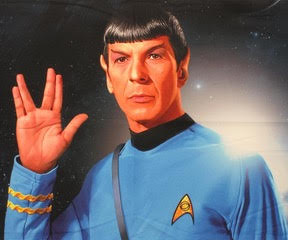
Can you imagine Star Trek’s Mr. Spock with his trademark pointy ears… plus cherry-red skin, horns, and a forked tail?
Gene Roddenberry, the sci-fi series’ creator, could. And that was kind of a problem.
As the world celebrated Star Trek’s 50th anniversary earlier this month, countless tributes heaped praise on Roddenberry for fighting tirelessly for his creative vision, of a story about a multiracial, multicultural crew exploring an infinitely multicultural universe.
It’s true, Roddenberry stood fast, and because he did, Star Trek became the barrier-breaking and beloved franchise it is today.
But Roddenberry was not hostile to revision. In fact, you could say the changes he did make are just as critical to the show’s success as the ones he resisted.
It could not have been easy. Several networks rejected the series because executives were uncomfortable with the black American character Lt. Uhura (Nichelle Nicols) working as an officer alongside white men. At a time when WWII was a recent memory, and at the height of the Cold War, the Japanese Mr. Sulu (George Takei) and the Russian Mr. Chekhov (Walter Koenig) made them equally uneasy.
Roddenberry persisted — through two more years of rejection, until Lucille Ball and Desi Arnaz’s production company ordered 13 episodes.
Once on the air, the pressure to water it down continued. In a recent BBC interview, Roddenberry’s colleague Herb Solow recalled advertisers refusing to sponsor an episode after Roddenberry refused to drop a scene featuring a green-skinned alien woman, scantily dressed, dancing in a scene with Captain Kirk.
Star Trek exists because Roddenberry fought for his vision. But he also knew when to heed feedback and revise. Early drafts of the pilot, Solow said, described Spock as, basically, Satan. “Believe me,” Solow said, chuckling, “ I told him, no one is going to sponsor a TV series where one of the stars is the devil.”
More importantly, Spock’s character would become the voice of reason, and often the conscience on the Enterprise’s bridge. In the Wrath of Khan, he sacrifices himself for the crew, uttering the memorable line, “The needs of the many outweigh the needs of the few. Or the one.”
Hard to see Spock becoming the show’s moral center, let alone occupying the large psychic space he holds in our culture, wearing what’s essentially a drug-store Halloween costume.
Gotham fiction teacher Scott Hess likes to say that revision isn’t only about cutting, cutting, cutting:
“Freedom is important too, because in revision just as in your first draft, you have the opportunity to say let’s try this, now let’s try that.”
We all want to fight for our creative vision, and we should. Gene Roddenberry’s example reminds us we should also be open to change. In its freedom, we open ourselves to new frontiers.

Kelly Caldwell
Dean of Faculty


